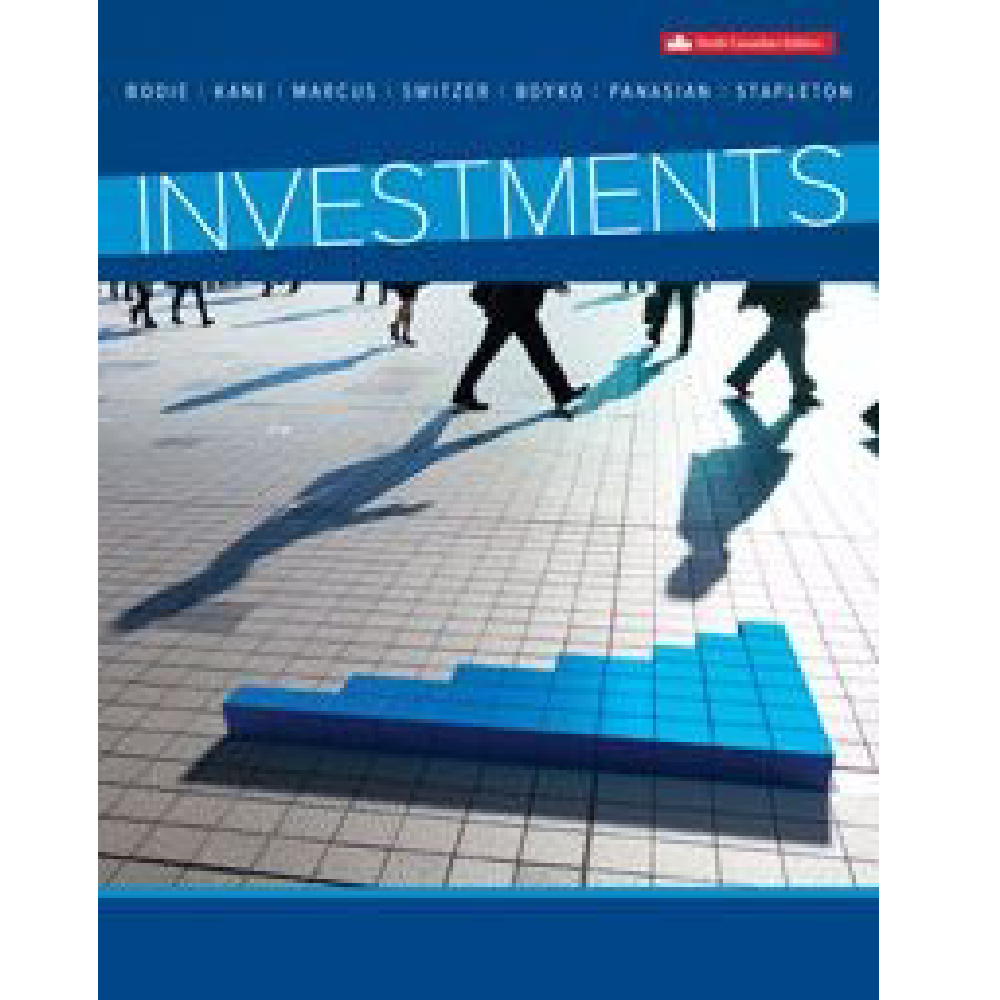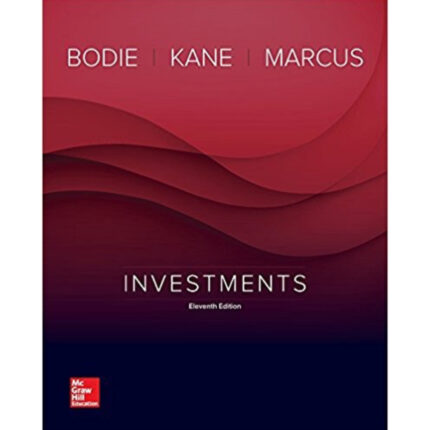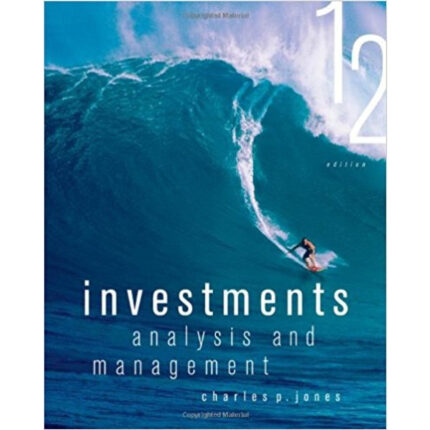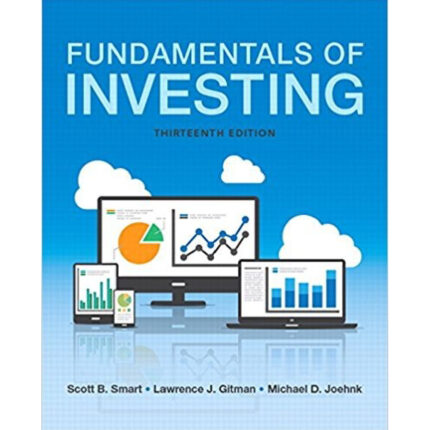Investments 9Th Canadian Edition By Bodie – Test Bank
Chapter 11
The Efficient Market Hypothesis
Multiple Choice Questions
1. If you believe in the ________ form of the EMH, you believe that stock prices reflect all relevant information, including historical stock prices and current public information about the firm, but not information that is available only to insiders.
A. semistrong
B. strong
C. weak
D. All of the options are correct.
E. None of the options are correct.
Accessibility: Keyboard Navigation
Blooms: Remember
Difficulty: Easy
Learning Objective: 11-01 Random Walks and the Efficient Market Hypothesis.
Topic: 11-01 Random Walks and the Efficient Market Hypothesis
2. When Maurice Kendall examined the patterns of stock returns in 1953, he concluded that the stock market was __________. Now, these random price movements are believed to be _________.
A. inefficient; the effect of a well-functioning market
B. efficient; the effect of an inefficient market
C. inefficient; the effect of an inefficient market
D. efficient; the effect of a well-functioning market
E. irrational; even more irrational than before
Random price changes were originally thought to be driven by irrationality. Now, financial economists believe random price changes occur because markets are informationally efficient.
Accessibility: Keyboard Navigation
Blooms: Understand
Difficulty: Easy
Learning Objective: 11-01 Random Walks and the Efficient Market Hypothesis.
Topic: 11-01 Random Walks and the Efficient Market Hypothesis
3. The stock market follows a
A. nonrandom walk.
B. random walk
C. predictable pattern that can be exploited.
D. nonrandom walk and predictable pattern that can be exploited.
E. submartingale and predictable pattern that can be exploited.
The stock market follows a submartingale.
Accessibility: Keyboard Navigation
Blooms: Remember
Difficulty: Easy
Learning Objective: 11-01 Random Walks and the Efficient Market Hypothesis.
Topic: 11-01 Random Walks and the Efficient Market Hypothesis
4. Womack focuses on changes in analysts’ recommendations and finds that
A. positive changes are associated with decreased increased stock prices of about 5%, and positive changes result in average price decreases of 11%.
B. positive changes are associated with increased stock prices of about 5%, and negative changes result in average price decreases of 11%.
C. positive changes are associated with increased stock prices of about 11%, and negative changes result in average price decreases of 5%.
D. negative changes are associated with increased stock prices of about 5%, and positive changes result in average price decreases of 11%.
E. negative changes are associated with increased stock prices of about 11%, and positive changes result in average price decreases of 5%.
Accessibility: Keyboard Navigation
Blooms: Understand
Difficulty: Easy
Learning Objective: 11-05 Mutual Fund and Analyst Performance.
Topic: 11-05 Technical Analysis
5. Patell and Wolfson show that most of the stock price response to corporate dividend or earnings announcements occurs
A. within 10 hours of the announcement.
B. within 10 days of the announcement.
C. within 10 minutes of the announcement.
D. within 10 seconds of the announcement.
E. within 60 minutes of the announcement.
Accessibility: Keyboard Navigation
Blooms: Remember
Difficulty: Easy
Learning Objective: 11-01 Random Walks and the Efficient Market Hypothesis.
Topic: 11-01 Random Walks and the Efficient Market Hypothesis
6. Proponents of the EMH typically advocate
A. an active trading strategy.
B. investing in an index fund.
C. a passive investment strategy.
D. an active trading strategy and investing in an index fund.
E. investing in an index fund and a passive investment strategy.
Believers of market efficiency advocate passive investment strategies, and an investment in an index fund is one of the most practical passive investment strategies, especially for small investors.
Accessibility: Keyboard Navigation
Blooms: Remember
Difficulty: Easy
Learning Objective: 11-02 Implications of the EMH.
Topic: 11-02 Competition as the Source of Efficiency
7. Proponents of the EMH typically advocate
A. buying individual stocks on margin and trading frequently.
B. investing in hedge funds.
C. a passive investment strategy.
D. buying individual stocks on margin, trading frequently, and investing in hedge funds.
E. investing in hedge funds and a passive investment strategy.
Accessibility: Keyboard Navigation
Blooms: Remember
Difficulty: Easy
Learning Objective: 11-02 Implications of the EMH.
Topic: 11-02 Competition as the Source of Efficiency
8. If you believe in the _______ form of the EMH, you believe that stock prices only reflect all information that can be derived by examining market trading data, such as the history of past stock prices, trading volume or short interest.
A. semistrong
B. strong
C. weak
D. All of the options are correct.
E. None of the options are correct.
Accessibility: Keyboard Navigation
Blooms: Remember
Difficulty: Easy
Learning Objective: 11-01 Random Walks and the Efficient Market Hypothesis.
Topic: 11-01 Random Walks and the Efficient Market Hypothesis
9. If you believe in the _________ form of the EMH, you believe that stock prices reflect all available information, including information that is available only to insiders.
A. semistrong
B. strong
C. weak
D. All of the options are correct.
E. None of the options are correct.
Accessibility: Keyboard Navigation
Blooms: Remember
Difficulty: Easy
Learning Objective: 11-01 Random Walks and the Efficient Market Hypothesis.
Topic: 11-01 Random Walks and the Efficient Market Hypothesis
10. If you believe in the reversal effect, you should
A. buy bonds in this period if you held stocks in the last period.
B. buy stocks in this period if you held bonds in the last period.
C. buy stocks this period that performed poorly last period.
D. go short.
E. buy stocks this period that performed poorly last period and go short.
The reversal effect states that stocks that do well in one period tend to perform poorly in the subsequent period, and vice versa.













Reviews
There are no reviews yet.